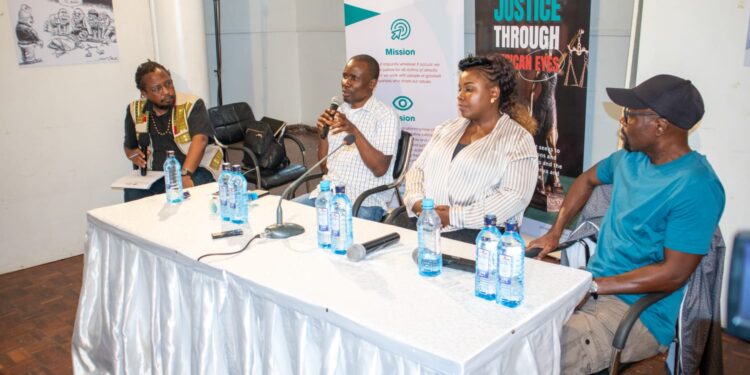“Cartoonists take sides… I take the side of justice… Our goal as cartoonists is influencing change.”
The unapologetic description of his profession offered by Gado, the most syndicated political cartoonist in East and Central Africa, echoed the goal of the ongoing second edition of the “Justice Through African Eyes” cartoon exhibition which, according to some of the promotion literature, seeks “…to expand the level of public discourse by provoking conversations on accountability on the continent”.
And Celeste, Kenya’s first female editorial cartoonist, agreed with Gado’s sentiments – that successful cartoonists are not neutral: “They are always on the side of the vulnerable. They criticise any injustice they come across.”
Gado, identified more conventionally as Tanzanian Godfrey Mwampembwa, and Celeste, who is Kenyan artist Celestine Wamiru, were speaking during a panel discussion that accompanied the launching of the exhibition, which opened at the Kenya Cultural Centre in Nairobi on March 16, 2022.
The display of works of art on justice and human rights, which aims to increase public awareness and inspire debate on narratives of justice in Africa, will run until March 31, and will showcase a selection from the creations of some of the continent’s most visible cartoonists.
Gado and Celeste, who were members of the discussion panel, agreed that as artists, they feel passionate about taking a stand on important matters in society.
“It is important to take sides when addressing certain issues, and I have always done that through my career, without fear or favour,” said Gado.
“I am always on the side of the vulnerable, a side that has a conscience. I make it very deliberate to dedicate two days of the week to do a social justice and environmental piece,” Celeste added.
The works on display at the cultural centre’s Cheche Gallery feature cartoons by some of Africa’s most famous artists, including South African Jonathan Shapiro (Zapiro), French-Burkinabe Damien Glez (Glez), Gado, Sudanese Osman Ali Obaid Alamin, Ivorian Karlos Guédé Gou (Liadé Guedé Carlos Digbeu), and Kenyan Paul Kelemba (Maddo).
Other cartoonists include Celeste; Alphonce Omondi Oketch (Ozone, Kenyan); Eric Jacob Ngammau (GaMMZ aka Kiddo, Kenyan); Mohammed Jumanne (Dr Meddy, Tanzania); Patrick Gathara (Kenyan); and Hannington Okello (Kenyan).
The creations of Victor Ndula (Kenyan); Nestory Fedeliko (FEDE – Tanzania); and and Brian Vincent Oirya (Kenya) are also on display.
The exhibition was organised by The Hague-based Journalists For Justice (JFJ) in collaboration with Africa No Filter, a donor collaborative focused on shifting the African narrative through amplifying African stories and supporting the continent’s creatives. The first cartoon show took place in Banjul, The Gambia, in February 2022, while two others are planned for Uganda and Nigeria later in the year. An online digital show of the cartoons is expected to start later this month.
Africa’s cartoonists have been some of the most consistent voices in debates on important subjects that touch on the lives of the people, including justice, democracy, human rights, and electoral processes. The artists have become a collective voice against impunity, calling out double standards and exposing contradictions in Africa’s dealings with these subjects. In the all-too-common absence of true freedom as tyranny continues to rise in Africa, cartoonists have increasingly taken up the role of shining a light on the gaps in the continent’s search for justice and speaking truth to power.
Gado described cartooning as more than just drawing, but work that requires “voracious” reading and research.
Some participants in the discussion moderated by media and communication expert Kimani wa Wanjiru expressed concern that the dominance of politics in public spaces and traditional media such as newspapers, especially in Kenya as the elections approach, risked pushing other important issues, such as the plight of victims of electoral and gender-based violence, away from the public eye.
“There is a need to change the narrative in our daily newspapers, which have 100 per cent political content. Cartoonist need to discuss other ills facing the country,” said Jacky Mutere, the co-founder of Grace Agenda, an advocacy group pushing for reparations and memoralisation for survivor’s of sexual violence.
“We should adapt as creators and keep up with the changing trends,” Gado said, adding that cartoonists can use their power of satire to express the concept of justice from any perspective.
“We are in campaign mode and everything is optics. Cartoons teach you the vocabulary you need to pick up and be careful about,” amateur journalist Tom Odhiambo, who writes on literature, art, and culture, and who was also the third panellist at the discussion, said.
Celeste agreed that cartoonists need to change with the times. As traditional media such as newspapers suffer disruption and their circulation shrinks, with audiences shifting to the digital sphere, artists need to adapt to the new trends and explore online platforms to continue their discussions on social justice and human rights, she explained.
Odhiambo described the exhibition as a provocation to Africans to engage in conversations on accountability and why issues around reparations remain unresolved.
Under the section dedicated to electoral justice, there were many works on Africa’s electoral democracy, especially unfair political justice systems. Gado, whose works feature several African leaders, including Rwandan President Paul Kagame and former Gambia President Yahya Jammeh, said he felt obliged to comment on injustices because he is a pan-Africanist. For him, talking about African issues is part of his passion for defending free speech.
Speaking during an interview on the sidelines of the exhibition, Celeste said cartoons are a special language that can be used to tackle difficult topics in a way the written word cannot.
On electoral justice, she said cartoons are a documentation of African experiences in connection with elections, allowing artists to tell their story and provoke people to think about their rights and choices, and justice.
“We seek to aggregate critical voices from the rich array of some of the continent’s best-known cartoonists to present how Africans have experienced and debated justice,” Rosemary Tollo, JFJ’s Programme Director, commented on the organisation’s Twitter page.







